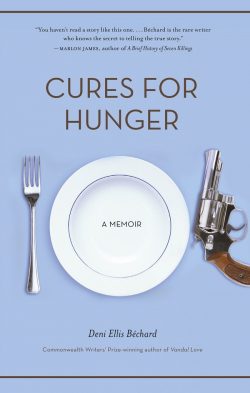#782 You work or you starve
Cures for Hunger: A Memoir
by Deni Ellis Béchard
Fredericton: Goose Lane Editions, 2019 (first published by Milkweed Editions, 2012)
22.95 / 9781773101453
Reviewed by Luanne Armstrong
*
 When I was a girl, growing up on a backwoods farm in southeastern BC, I loved to listen to men talk. They were so sure of themselves. In their world, things were made to work, to be beaten, hammered, nailed, or haywired into shape. When something went wrong, it was always a “she,” whether it was a tractor or a chainsaw.
When I was a girl, growing up on a backwoods farm in southeastern BC, I loved to listen to men talk. They were so sure of themselves. In their world, things were made to work, to be beaten, hammered, nailed, or haywired into shape. When something went wrong, it was always a “she,” whether it was a tractor or a chainsaw.
I was my dad’s helper. Where he went, I went, and what he did, I did. My dad’s mantra was simple. “You see, you do.” So my brothers and I at an early age learned to drive tractors, put up hay, chase cows, milk cows, prune fruit trees, kill animals, and run chain saws.
At twelve, I turned into a girl and my father sent me in the house to help my mother. I watched as my younger brother and my father raged at each other until my brother left.
It took me a long time and a lot of writing to understand the harshness of my dad’s world. He was a good man but his other mantra was, “You work or you starve.” So he drove himself, and his children, mercilessly, to work, and to work hard. But at that time in BC history, the farmers, miners, and foresters were still opening up the land, and life could be, indeed, hard and merciless.

I recognized many of the characteristics of my father in the father in Béchard’s memoir, the brooding loneliness, the frequent anger, the conflicted contradictions of love and hunger that Béchard’s father inflicted on his son.
For many writers, a difficult or traumatic upbringing with abusive parents, can, at least, prove useful. But such parents are always a conundrum, a story the writer can deconstruct for years, and still be hard to get clear. Béchard’s attempt to understand his father began when he was very young — his love for his explosive dad was always tinged with anxiety and questions.
As he gets older, and leaves BC to live with his mother, brother, and sister in a trailer in Virginia, his questions about his distant father grow even more insistent. Eventually, he leaves to live with his father; at fifteen, he helps with his father’s often illegal fish business but also, against his father’s wishes, he is determined to stay in school and become a writer. He discovers, and is fascinated by, his father’s violent criminal history. But Béchard has no way of judging whether his father’s stories are true or even close to true.

Eventually, becoming a writer is what saves him, since he goes away to college in the US, and doesn’t come back, despite his father’s pleas for help. But he remains fascinated by his father’s stories, which are told in late night long-distance calls on a pay phone. Finally, old, ill, and bankrupt, his father kills himself, and Béchard searches for and finally tracks down his father’s Québec family whom he has never met and knows little about. His understanding of the pain and violence within his father’s family gives him some context, finally, for his own father.
This is an odd book, beautifully written, with a kind of self-conscious lyricism that reminded me a bit of writer James Lee Burke. Béchard’s mother, sister, and brother barely come into the story because he wants to protect them, but the result is that his mother is an invisible enigmatic figure who clearly has a story of her own. In fact, women barely come into the story, except for Béchard’s father’s occasional regret at never contacting his mother.
Béchard never really resolves the contradictory love-hate, push-and-pull tangle that remains at the heart of his fascination with his father. The book is a powerful illustration and evisceration of male culture, of the way men both honour and betray each other; the incredible difficulty that men (such as my father) had in simply being loving and loved. I think such men were and are terribly lonely, trapped in a place where they bar themselves from letting love into their lives.

Fortunately, Béchard has very much achieved his dream of becoming a successful American-Canadian writer. Cures for Hunger was first published in the US by Milkweed Editions, and Béchard has also had a very successful career as a journalist reporting from many violent parts of the world, such as the Congo, Iraq, and Afghanistan. He has written three novels and four other works of non-fiction, but this memoir took him seventeen years to write. It went through several different iterations as a novel before finally becoming a memoir.
In the end, it is not clear whether Béchard will ever be done with untangling the emotional web that ties him to his father. And perhaps that is how it should be. Human lives never come in tidy packages, nor is there ever a real cure for the hunger that drives so many lives into difficult places. This is a book that explores that hunger and the resulting darkness with a clear, sharp, and also loving gaze, a story that leaves the reader with an unsettled sense of poignancy and sorrow.
*

Luanne Armstrong has written twenty-one books. She writes young adult book, fiction, nonfiction and poetry. She has contributed to many anthologies and edited a Canadian non-fiction anthology called Slice Me Some Truth (Wolsak and Wynn, 2011). She has been nominated or won many awards, including the Moonbeam Award the Chocolate Lily Award, the Hubert Evans nonfiction Book award; the Red Cedar Award, Surrey Schools Book of the Year Award, the Sheila Egoff Book Prize, and the Silver Birch Prize. Luanne lives on her hundred year-old family farm on Kootenay Lake. She mentors many emerging writers all over the world on a long term basis, and in the last three years has edited eight books through to publication. Her last book was Sand, a young adult book for Ronsdale Press. Her new book, A Bright and Steady Flame, The Story of an Enduring Friendship, was published by Caitlin Press in 2018. She is now working on a book of essays, Going to Ground, as well as a new book of poetry, When We Are Broken.
*
The Ormsby Review. More Books. More Reviews. More Often.
Publisher and Editor: Richard Mackie
The Ormsby Review is a journal service for in-depth coverage of B.C. books and authors. The Advisory Board consists of Jean Barman, Robin Fisher, Cole Harris, Wade Davis, Hugh Johnston, Patricia Roy, David Stouck, and Graeme Wynn. Scholarly Patron: SFU Graduate Liberal Studies. Honorary Patron: Yosef Wosk. Provincial Government Patron since September 2018: Creative BC
“Only connect.” – E.M. Forster
One comment on “#782 You work or you starve”